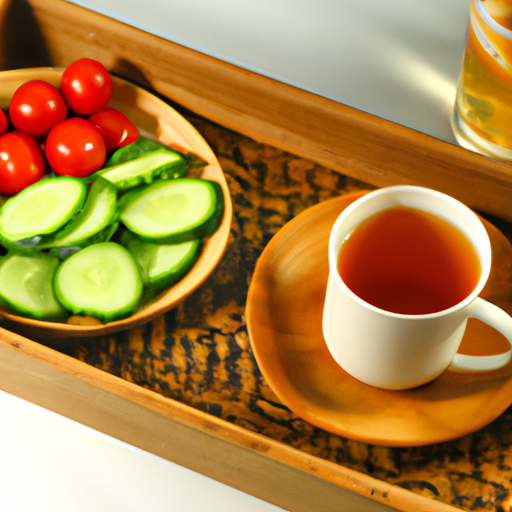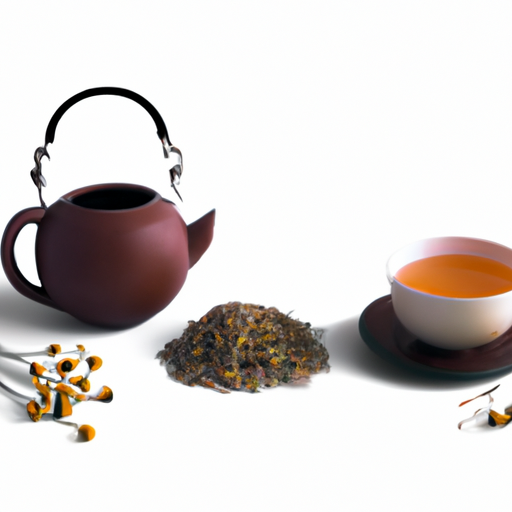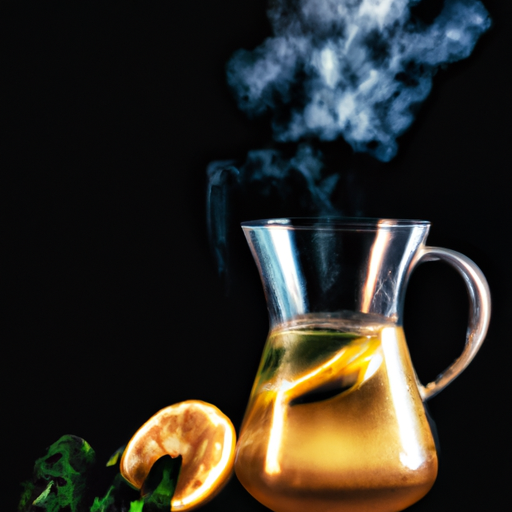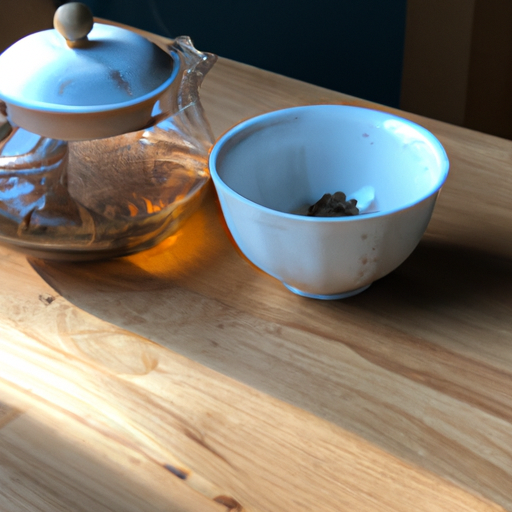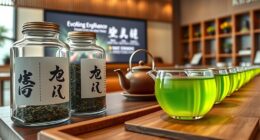I’m truly fond of sipping on barley tea. It serves as both a revitalizing and soothing drink which I frequently savor on warm summer days or throughout the colder season. However, what I’ve discovered is that barley tea isn’t solely an excellent beverage by itself, it also pairs wonderfully with an array of dishes.
If you’re not familiar with barley tea, it’s a popular beverage in many Asian countries, particularly in Japan and Korea. It’s made by roasting barley grains and steeping them in hot water, resulting in a nutty, toasty flavor that’s both soothing and satisfying.
And while it’s delicious on its own, I’ve found that pairing it with certain foods can really elevate the experience. In this article, I’ll share some of my favorite foods to enjoy with barley tea, from light snacks to hearty meals and even desserts.
Key Takeaways
- Barley tea pairs well with light snacks like rice crackers, roasted nuts, and fresh fruit.
- It also goes well with Asian dishes such as teriyaki chicken, bulgogi, sushi, and miso soup.
- Barley tea is a great alternative to sugary drinks and can cleanse the palate between bites of food.
- For dessert, it pairs well with fruit tarts and ice cream, and can be enhanced with honey, lemon, or mint leaves.
Overview of Barley Tea
Barley tea is a popular beverage in East Asia. It’s a refreshing and caffeine-free drink made from roasted barley grains. It has a distinct nutty flavor and a mild sweetness that makes it a perfect thirst-quencher on a hot summer day.
Aside from its refreshing taste, barley tea also boasts several benefits. It can aid digestion, improve blood circulation, and reduce stress. It’s also loaded with antioxidants and has anti-inflammatory properties that can help boost the immune system.
To make barley tea at home, all you need is roasted barley grains and water. Simply boil water and add the roasted barley grains to it. Let it steep for a few minutes, then strain the mixture to remove the grains. You can also add honey, lemon, or mint leaves to enhance the flavor. Barley tea can be served hot or cold, and it can be stored in the refrigerator for up to a week.
Pairing barley tea with light snacks can make for a delightful and healthy snack time. Some of my favorite snacks to enjoy with barley tea are rice crackers, roasted nuts, and fresh fruit. The nutty flavor of the tea complements the mild sweetness of the snacks, making for a perfect balance of flavors.
So, grab a cup of barley tea and a light snack, and savor the refreshing taste of this East Asian favorite.
Light Snacks
When it comes to enjoying a cup of barley tea, I find that light snacks are the perfect accompaniment.
Personally, I love snacking on rice crackers, which have a satisfying crunch and pair well with the nutty flavor of the tea.
Another favorite of mine is edamame, which adds a touch of saltiness and protein to the mix.
And if I’m feeling particularly health-conscious, I’ll opt for a refreshing seaweed salad, which offers a burst of flavor and a dose of antioxidants.
Rice Crackers
If you’re looking for a crunchy snack to pair with your barley tea, rice crackers are a great option. For example, I love snacking on rice crackers while sipping on a refreshing glass of barley tea on a hot summer day. Rice crackers are a popular Japanese snack that can be found in many Asian markets and grocery stores. They come in different shapes, sizes, and flavors, making them a versatile snack that can complement the taste of barley tea.
When it comes to flavor pairings, plain or lightly salted rice crackers are a safe bet as they won’t overpower the subtle taste of barley tea. However, if you’re feeling adventurous, there are many other flavors to try such as seaweed, wasabi, or soy sauce. Some popular brands to try include Kameda Crisps, Sanko Rice Crackers, and Senbei. These brands offer a variety of flavors and textures that can enhance your snacking experience with barley tea. Now, let’s move on to another tasty snack that goes well with barley tea – edamame.
Edamame
One of the healthiest and tastiest snacks to enjoy with a refreshing drink is definitely edamame. Not only is it a great source of plant-based protein, but it also contains essential nutrients such as fiber, folate, and vitamin K.
Here are three ways to prepare edamame as a snack:
-
Boiled: Simply boil edamame pods in salted water for 5-10 minutes until tender, then drain and sprinkle with sea salt for a classic snack.
-
Roasted: Toss edamame pods with olive oil and your choice of seasonings (such as garlic powder or smoked paprika) and roast in the oven at 400°F for 15-20 minutes until crispy.
-
Spicy: Mix boiled edamame with a spicy seasoning blend (such as gochujang or sriracha) for a flavorful kick.
Aside from being a great snack, edamame also has nutritional value as a side dish or addition to a meal. It pairs well with rice, noodles, and stir-fry dishes.
Now, let’s move on to the next dish that complements barley tea perfectly – seaweed salad.
Seaweed Salad
Oh, you haven’t lived until you’ve tasted the savory explosion in your mouth that is seaweed salad – the perfect accompaniment to a refreshing glass of barley tea. The combination of the nutty flavor of barley tea and the umami taste of seaweed salad is simply divine.
And let’s not forget about the health benefits of seaweed in barley tea. Seaweed is packed with vitamins and minerals, including iodine, which is essential for thyroid function. It also contains antioxidants that help protect against cell damage and reduce inflammation.
To make the most of this delicious pairing, I recommend trying different seaweed salad dressings to find your favorite. Some dressings are made with soy sauce, sesame oil, and rice vinegar, while others use miso paste or yuzu juice. Each dressing adds a unique flavor profile to the salad, making it a fun and tasty experience.
So, next time you brew a pot of barley tea, don’t forget to grab a bowl of seaweed salad to go with it.
And speaking of Japanese cuisine, another great food that goes well with barley tea is sushi and sashimi.
Sushi and Sashimi
Sushi and sashimi pair perfectly with a refreshing glass of barley tea, enhancing the flavors of the delicate seafood. When it comes to sushi presentation, it’s important to take into account the type of fish being used.
For example, fatty fish like salmon or yellowtail pairs well with a bolder barley tea, while lighter fish like tuna or snapper pairs better with a milder barley tea. Additionally, if you’re looking to pair sashimi with barley tea, it’s important to consider the variations of sashimi and their compatibility with different types of barley tea.
One of my favorite pairing suggestions for sushi and sashimi is to match them with a cold glass of roasted barley tea. The nutty and slightly sweet flavor of the tea complements the fresh and light taste of the seafood, creating a perfect balance of flavors. If you’re feeling adventurous, try pairing your sushi with a green barley tea, which has a grassy and refreshing taste that complements the subtle flavors of white fish.
Moving on to the next section, grilled meats, one of my go-to pairings is a bold and robust barley tea. The smoky and charred flavors of grilled meats are well complemented by the rich and earthy taste of barley tea.
Whether you’re grilling a steak or some chicken, a glass of barley tea will bring out the best flavors of your meat.
Grilled Meats
I absolutely love grilled meats, and there are a few dishes that I always crave. First up is yakitori – skewered chicken pieces grilled to perfection. The smoky flavor and tender texture make it a must-try for any meat lover.
Next, there’s bulgogi, a Korean dish made with marinated beef that’s grilled to perfection. The sweet and savory flavors are a match made in heaven.
Finally, teriyaki chicken is a classic Japanese dish that’s always a crowd-pleaser. The sticky, sweet glaze on the juicy chicken is simply irresistible.
Yakitori
Hey, if you’re looking for a match made in heaven, pairing yakitori with barley tea is like hitting a home run with your taste buds.
Yakitori is a Japanese dish consisting of grilled chicken skewers that are marinated in a savory sauce and cooked over hot charcoal. When paired with a cold glass of barley tea, the combination creates a refreshing and satisfying taste that is perfect for any occasion.
Grilled Yakitori Pairings are endless, and there are many Yakitori Recipe Variations to choose from. Some popular yakitori skewers include chicken thigh, chicken skin, and chicken meatball. Each skewer is cooked to perfection and has a unique flavor profile that complements the nutty taste of barley tea.
So, if you’re looking for a delicious and healthy meal that will satisfy your taste buds, look no further than yakitori paired with barley tea.
Now, let’s move on to the next section and talk about how barley tea can enhance the flavor of bulgogi.
Bulgogi
Get ready to experience a mouth-watering explosion of flavors as you sink your teeth into tender slices of marinated beef in the Korean dish known as bulgogi. This dish is made by marinating thinly sliced beef in a sweet and savory sauce made of soy sauce, sugar, sesame oil, garlic, and other seasonings. The result is a deliciously caramelized and tender meat that pairs perfectly with a refreshing glass of barley tea.
Speaking of barley tea, did you know that it has numerous health benefits? Not only is it a great source of antioxidants, but it also has anti-inflammatory properties and can aid in digestion. Plus, it’s a great alternative to sugary drinks and can help keep you hydrated.
So, if you’re looking for a healthy and delicious way to wash down your bulgogi, look no further than a chilled glass of barley tea.
And now, let’s move on to the next section where we’ll talk about another delicious dish that pairs perfectly with barley tea – teriyaki chicken.
Teriyaki Chicken
After discussing the delicious pairing of bulgogi with barley tea, I’m excited to move on to another Asian dish that goes perfectly with this refreshing beverage: teriyaki chicken.
As someone who loves Japanese cuisine, I’ve tried many variations of teriyaki chicken and found that the key to making it truly delicious is in the marinade. Here are some ways to marinate teriyaki chicken for maximum flavor:
-
Soy sauce and brown sugar: This classic combination creates a sweet and savory flavor that’s perfect for teriyaki chicken. Add some garlic and ginger for an extra kick.
-
Pineapple juice and honey: For a tropical twist on teriyaki chicken, try using pineapple juice and honey in your marinade. The sweetness of the pineapple pairs perfectly with the salty soy sauce.
-
Sake and mirin: For a more traditional Japanese flavor, use sake and mirin in your marinade. These two ingredients add a depth of flavor that’s hard to replicate with anything else.
Once you have your teriyaki chicken marinated and cooked to perfection, it’s time to think about what to pair it with. Here are some traditional Japanese dishes that go well with teriyaki chicken:
-
Rice: This may seem like an obvious choice, but it’s a classic for a reason. The neutral flavor of rice pairs perfectly with the bold flavors of teriyaki chicken.
-
Miso soup: The umami flavor of miso soup complements the sweetness of teriyaki chicken. Plus, it’s a great way to get some extra veggies in your meal.
-
Edamame: These lightly salted soybeans are a great side dish for teriyaki chicken. They add a pop of color and texture to your meal.
Now that we’ve explored the delicious pairing of teriyaki chicken with traditional Japanese dishes, let’s move on to another staple of Asian cuisine: noodles.
Noodles
I absolutely love noodles, and when it comes to Japanese cuisine, there are three types that stand out: ramen, udon, and soba.
Ramen is a hearty soup dish that’s perfect for colder weather. It’s made up of wheat noodles served in a meat or fish-based broth.
On the other hand, udon is a thick and chewy noodle that’s often served in a simple broth with vegetables and meat.
Soba is made from buckwheat flour and has a nutty flavor. It’s often served cold with a dipping sauce, making it a refreshing choice for hot summer days.
Ramen
If you’re craving comfort food, nothing pairs better with a hot bowl of ramen than a refreshing glass of barley tea. Ramen is a Japanese dish that consists of broth, noodles, and various toppings.
When it comes to the broth options, there are three main types: shio (salt-based), shoyu (soy sauce-based), and miso (fermented soybean paste-based). Each broth has its unique flavor and pairs well with different toppings. For example, shio broth is light and refreshing, while shoyu broth is savory and rich. As for miso broth, it has a deep and complex flavor that goes well with bold toppings like pork belly and mushrooms.
As for noodle types, there are also various options to choose from. Ramen noodles can be thin or thick, curly or straight, and have different levels of chewiness. Generally, thin and straight noodles are better suited for lighter broths, while thick and curly noodles are better for heavier broths. As for chewiness, it’s a matter of personal preference. Some people enjoy noodles that are firm and springy, while others prefer noodles that are soft and tender.
In any case, barley tea is an excellent choice to balance out the flavors of ramen. Its nutty and slightly sweet taste provides a refreshing contrast to the umami-rich broth and savory toppings.
Transitioning to the next section about udon, this Japanese noodle dish is similar to ramen but has thicker noodles and a milder flavor. While it can also be enjoyed with barley tea, the pairing is not as perfect as with ramen. However, udon can be paired with other drinks like green tea or sake for a more authentic Japanese dining experience.
Udon
Before we move on to udon, let’s take a moment to appreciate the delicious combination of ramen and barley tea. The savory broth of the ramen pairs perfectly with the nutty flavor of barley tea, making for a comforting and satisfying meal. Whether you’re enjoying a bowl of tonkotsu or shoyu ramen, don’t forget to have a glass of barley tea on the side.
Now onto udon. This thick and chewy Japanese noodle can be enjoyed in many variations, from simple dishes like kake udon (udon in hot broth) to more elaborate ones like kitsune udon (udon topped with fried tofu). Personally, I love having my udon with tempura bits and green onions for a crunchy texture and added flavor. Udon toppings can vary greatly, from meats like beef or chicken to vegetables like mushrooms and seaweed.
No matter how you enjoy your udon, it’s sure to be a filling and delicious meal that would go well with a cold glass of barley tea.
As we move on to the next section about soba, let’s not forget about the versatility of udon and how it can be enjoyed in a variety of ways.
Soba
Don’t underestimate the power of soba noodles and their ability to add a unique texture and flavor to your dishes. Soba noodles are made from buckwheat flour, which gives them a nutty and earthy flavor. They are a popular staple in Japanese cuisine and can be enjoyed hot or cold.
Here are some soba recipes that you should try:
-
Soba noodle soup: This is a simple and comforting dish that is perfect for a cold day. The broth is made with soy sauce, dashi, and mirin, and is topped with sliced scallions, kamaboko, and nori. The soba noodles are cooked separately and added to the soup just before serving.
-
Soba salad: This is a refreshing and healthy dish that is perfect for a summer day. The soba noodles are mixed with a variety of vegetables, such as cucumber, carrot, and bell pepper, and dressed with a soy sauce and sesame oil dressing. The salad can be topped with grilled chicken or tofu for added protein.
-
Soba stir-fry: This is a quick and easy dish that is perfect for a busy weeknight. The soba noodles are stir-fried with a variety of vegetables, such as broccoli, mushrooms, and snap peas, and seasoned with soy sauce and sesame oil. The stir-fry can be topped with sliced beef or shrimp for added protein.
-
Soba noodles with dipping sauce: This is a traditional way of serving soba noodles in Japan. The soba noodles are cooked separately and served cold with a dipping sauce made with soy sauce, mirin, and dashi. The dipping sauce can be garnished with sliced scallions, grated daikon, and wasabi.
In addition to their delicious taste, soba noodles also have several health benefits. They’re a good source of fiber and protein and are low in fat and calories. They’re also gluten-free, which makes them a great alternative for people with gluten intolerance.
Incorporating soba noodles into your diet is a great way to improve your health and add variety to your meals.
Moving on to the next section, let’s talk about tempura.
Tempura
I absolutely love tempura – it’s one of my all-time favorite Japanese dishes. What’s not to love about crispy, fried batter surrounding delicious ingredients?
My top three go-to tempura options are shrimp, vegetables, and seafood. There’s just something so satisfying about biting into a perfectly cooked shrimp or a juicy piece of seafood enveloped in a light, crunchy coating.
And when it comes to vegetables, tempura is a great way to add some variety to your meal while still getting your daily dose of greens.
Shrimp
Shrimp pairs perfectly with barley tea, and did you know that Americans consume an average of 1.6 billion pounds of shrimp every year? Not only is shrimp a delicious addition to any meal, but it also has numerous health benefits.
Shrimp is high in protein and low in fat, making it a great option for those looking to maintain a balanced diet. Additionally, shrimp is a rich source of omega-3 fatty acids, which can help reduce inflammation and improve heart health.
When it comes to cooking methods, there are countless ways to prepare shrimp. Grilling, boiling, and sautéing are all popular options. Personally, I love to cook my shrimp with garlic and butter, creating a flavorful and indulgent dish. Pairing this with a refreshing glass of barley tea is the perfect way to balance the richness of the shrimp and create a well-rounded meal.
As much as I love shrimp, I also enjoy incorporating vegetables into my meals. Speaking of which, did you know that there are certain vegetables that pair particularly well with barley tea?
Vegetables
You’ll be pleasantly surprised by how your taste buds dance when you pair certain veggies with a refreshing glass of barley tea. Not only is barley tea a great alternative to sugary drinks, but it also complements the natural flavors of vegetables.
Here are three healthy recipes that incorporate seasonal produce and pair perfectly with barley tea:
-
Roasted carrots and beets: The sweetness of roasted carrots and beets pairs well with the nutty flavor of barley tea. Simply toss sliced carrots and beets with olive oil, salt, and pepper, and roast in the oven for 25-30 minutes at 400°F. Serve with a chilled glass of barley tea for a refreshing and satisfying meal.
-
Grilled zucchini and squash: Grilling zucchini and squash brings out their natural sweetness and adds a smoky flavor that pairs well with barley tea. Cut zucchini and squash into long strips, brush with olive oil, and grill for 5-7 minutes on each side. Serve with a side salad and a glass of chilled barley tea for a light and flavorful meal.
-
Stir-fried bok choy and shiitake mushrooms: Bok choy and shiitake mushrooms are both nutrient-dense and flavorful vegetables that pair well with the earthy notes of barley tea. Stir-fry sliced bok choy and shiitake mushrooms with garlic, ginger, and soy sauce for a quick and easy meal that’s packed with flavor. Serve with a glass of chilled barley tea for a refreshing and satisfying drink.
Now, let’s move on to seafood and see how it pairs with barley tea.
Seafood
Indulge in the mouthwatering flavors of seafood by pairing it with the refreshing notes of a chilled glass of barley tea. As a seafood lover, I highly recommend trying out different healthy options such as grilled salmon, shrimp, or even sushi with your barley tea.
The subtle nutty flavor of the tea complements the richness of seafood, making it a perfect match for a satisfying meal. Pairing seafood with different types of barley tea is a delightful experience.
If you prefer a milder taste, then opt for roasted barley tea, which has a slightly sweeter taste. For those who enjoy a more robust flavor, barley tea with roasted corn will do the trick. Either way, the barley tea will cleanse your palate and enhance the flavors of your seafood dish.
Now, let’s move on to the next section about fried rice.
Fried Rice
If you’re in the mood for a savory dish to pair with your barley tea, fried rice is an excellent choice. It’s a classic Asian dish that’s easy to make and goes well with many different flavors. The beauty of fried rice is that you can customize it to your liking, whether you want it with meat, vegetables, or both.
Pairing suggestions for fried rice and barley tea are endless. One option is to make a vegetable fried rice with carrots, peas, and corn. The sweetness of the vegetables complements the earthy flavor of the barley tea. Another pairing suggestion is to make a fried rice with shrimp or chicken. The protein in the dish adds richness to the tea, making it a more substantial meal.
Cooking tip: When making fried rice, it’s important to use cold, day-old rice to prevent it from becoming mushy. You also want to cook the rice in a wok or large skillet over high heat to achieve that signature smoky flavor. Don’t be afraid to add different sauces and spices to the dish to make it more flavorful.
Transitioning to the next subtopic, soups are another great option to pair with barley tea. It’s a comforting combination that’s perfect for colder weather. Whether you prefer a hearty soup like miso or a lighter broth-based soup, there’s a soup out there that will complement the unique flavor of barley tea.
Soups
I absolutely love soups, and there are three that I simply can’t get enough of: miso soup, tonkotsu ramen, and kimchi stew.
Miso soup is a traditional Japanese soup that’s made with miso paste, tofu, seaweed, and sometimes other ingredients like mushrooms and green onions.
Tonkotsu ramen, on the other hand, is a rich and creamy pork-based broth that’s typically served with noodles, chashu pork, and other toppings like bamboo shoots and soft-boiled eggs.
And last but not least, kimchi stew is a spicy and sour Korean soup that’s made with kimchi, pork, and other vegetables like onions, mushrooms, and tofu.
Each of these soups has its own unique flavor and texture, and I can’t wait to dive into why they’re some of my favorites!
Miso Soup
You’ll love how the nutty flavor and subtle sweetness of barley tea perfectly complements the savory umami taste of miso soup. As someone who loves Japanese cuisine, I can attest to how miso soup is a staple in many Japanese households.
There are various miso soup variations, but the basic ingredients are dashi, miso paste, tofu, and seaweed. It’s a healthy and comforting dish, perfect for cold weather or when you’re feeling under the weather.
Pairing miso soup with other teas may not be common, but I highly recommend trying it with barley tea. Here are five reasons why:
1) The nutty flavor of barley tea enhances the nuttiness of the miso paste.
2) The subtle sweetness of barley tea balances out the saltiness of the soup.
3) The refreshing taste of barley tea cleanses the palate between bites.
4) The lightness of barley tea complements the heaviness of the soup.
5) The warmth of barley tea matches the warmth of the soup, creating a cozy and comforting experience.
Moving on to the next topic, let’s talk about tonkotsu ramen.
Tonkotsu Ramen
When you think of rich and creamy ramen broth, tonkotsu ramen may come to mind. The broth is made by boiling pork bones for hours until they break down and release their collagen, creating a thick and flavorful soup. While tonkotsu ramen may seem heavy, it pairs surprisingly well with barley tea.
Barley tea’s nutty and slightly bitter flavor helps cut through the richness of the broth, while its mild sweetness complements the savory and salty seasoning choices that are commonly found in tonkotsu ramen. As someone who loves to pair drinks with meals, I highly recommend trying barley tea with your next bowl of tonkotsu ramen to balance out the flavors and enhance the overall experience.
Moving on to the next section about kimchi stew, the bold and spicy flavors of the dish make it another perfect pairing for barley tea.
Kimchi Stew
To fully experience the bold and spicy flavors of kimchi stew, try pairing it with a beverage that can balance out the heat and enhance the dish’s complexity. In my opinion, barley tea is the perfect accompaniment to this Korean dish. Not only does it have a light and refreshing taste, it also has a subtle nuttiness that complements the tangy and pungent flavors of kimchi stew.
For those who prefer a more adventurous pairing, there are also spicy variations of barley tea that can add an extra kick to the meal. However, if you’re looking for a vegetarian option, ginger tea is another great choice. Its warming and soothing properties can help tame the heat of the stew while also providing a complementary flavor profile. Overall, whether you’re a fan of traditional or unconventional pairings, barley tea and ginger tea are both excellent choices to enjoy with kimchi stew.
When it comes to desserts, there are plenty of options that can satisfy your sweet tooth.
Desserts
Indulge in some sweet treats that pair perfectly with barley tea, like a slice of warm apple pie or a scoop of rich vanilla ice cream.
But if you’re looking for a dessert that complements the earthy flavor of barley tea, try pairing it with a fruit tart. The sweetness of the fruit filling and the buttery crust of the tart contrasts the nutty flavor of the tea, creating a balanced taste.
Another dessert pairing idea is barley tea and ice cream. The creamy texture of the ice cream and the refreshing taste of barley tea make for a delightful combination. You can even experiment with different ice cream flavors, like green tea or black sesame, to find the perfect pairing.
Overall, when it comes to desserts that go well with barley tea, the options are endless. From classic apple pie to unique ice cream flavors, there’s something for everyone. But if you’re feeling adventurous, try making your own barley tea-infused dessert for a truly unique experience.
Now, let’s move on to other beverages that pair well with barley tea.
Other Beverages
I absolutely love trying out different beverages with my meals. When it comes to pairing drinks with barley tea, there are some great options out there. Green tea is a classic choice and provides a lovely contrast to the nutty flavor of barley tea. For those who enjoy a little bit of alcohol with their meals, sake is a great option that pairs well with a variety of dishes. And if you’re looking for something sweet, plum wine is a delicious and unique beverage that goes surprisingly well with barley tea.
Green Tea
Sipping on a warm, comforting cup of green tea while enjoying a hearty meal with barley tea as a beverage creates a perfect balance of flavors. Not only does green tea complement the nutty flavor profile of barley tea, but it also provides a host of health benefits that make it the perfect accompaniment to any meal.
From boosting metabolism to improving brain function and reducing the risk of certain diseases, the benefits of green tea are endless. There are also many different types of green tea blends that can be enjoyed alongside a refreshing glass of barley tea.
Whether you prefer the earthy taste of matcha or the delicate floral notes of jasmine green tea, there is a blend out there that will perfectly complement your meal. And with its low caffeine content, green tea is a great option for those looking to wind down after a long day.
With so many options to choose from, it’s no wonder that green tea is such a popular beverage around the world. Speaking of other beverages, have you tried pairing sake with your favorite barley tea?
Sake
After discussing green tea, let’s move on to another beverage that goes well with food: sake. Sake is a traditional Japanese rice wine that is often served with sushi and other Japanese dishes. However, I believe that sake can also be paired with non-Japanese cuisine. It’s all about finding the right flavor profile to complement the dish.
To help you get started with pairing sake with different types of food, I’ve put together a table of some common sake varieties and their flavor profiles. As you can see, there is a wide range of flavors to choose from, from light and crisp to bold and full-bodied. Some sakes have fruity notes, while others have a more earthy or nutty taste. I recommend trying a few different types of sake with different dishes to see which combinations work best for you.
When exploring sake, don’t be afraid to think outside the box and try pairing it with unexpected dishes. For example, a light and crisp sake could be a great match for a fresh salad or seafood dish, while a bold and full-bodied sake could stand up to rich meat dishes. With so many varieties of sake to choose from, there are endless possibilities for pairing it with different types of cuisine.
Moving on to the next topic, let’s talk about plum wine and how it can be paired with food.
Plum Wine
Let’s delve into the sweet and tangy world of plum wine, a delicious libation that adds a burst of flavor to any dish.
Plum wine is a popular Japanese beverage that’s made from fermented plums and sugar. It has a sweet and tangy taste that pairs well with many different types of food, including sushi, grilled meats, and spicy dishes.
Aside from its delicious taste, plum wine also offers a range of health benefits. It’s rich in antioxidants, which can help to reduce inflammation and improve heart health. Plum wine is also low in calories, making it a great option for those who’re watching their weight.
When it comes to the best brands of plum wine, some of my personal favorites include Choya, Takara, and Sho Chiku Bai. These brands offer a range of different flavors and styles, from sweet and fruity to dry and crisp.
Overall, plum wine is a great choice for anyone looking to add a burst of flavor to their meals while also enjoying some health benefits.
Frequently Asked Questions
What are the health benefits of drinking barley tea?
I absolutely love drinking barley tea, not only because of its delicious flavor, but also because of the numerous health benefits and nutrients it provides.
Barley tea is rich in antioxidants, which help to protect the body against harmful free radicals. It also contains high levels of fiber, which can aid in digestion and promote feelings of satiety.
Brewing techniques can greatly enhance the flavor of barley tea, whether it’s steeped using hot water or roasted to bring out a nutty, toasty taste. Overall, I find that drinking barley tea is a wonderful way to stay hydrated while also reaping the benefits of its many health-promoting properties.
Can barley tea be used as a substitute for coffee or black tea?
I know some people might be skeptical about using barley tea as a replacement for coffee or black tea. However, I believe barley tea has a unique taste that can rival both coffee and black tea.
When comparing the taste of barley tea to coffee, I’d say it has a smoother and milder flavor. It doesn’t have the bitter aftertaste that coffee sometimes leaves.
On the other hand, when comparing the caffeine content, barley tea has significantly less caffeine than black tea or coffee. So, if you’re looking for a caffeine boost, barley tea might not be the best option.
However, if you want a warm, comforting drink with a unique taste, barley tea might be worth a try.
What is the best way to prepare barley tea for optimal flavor?
When it comes to preparing barley tea for optimal flavor, there are a few key things to keep in mind.
First of all, you’ll want to pay attention to the boiling time – generally, you’ll want to let the tea steep for at least 10-15 minutes to allow the flavors to fully develop.
Additionally, using tea bags can be a great way to ensure that your tea is evenly brewed and doesn’t contain any loose grains or sediment.
If you want to add some extra flavor to your barley tea, there are plenty of sweeteners and other ingredients that can help enhance the taste.
Personally, I like to add a bit of honey or agave nectar for sweetness, and sometimes I’ll even throw in a slice of fresh ginger or a sprig of mint for a little extra kick.
Overall, I find that barley tea is a delicious and refreshing beverage that can be enjoyed on its own or paired with a wide variety of foods – so don’t be afraid to get creative!
Are there any cultural traditions or customs associated with drinking barley tea?
When it comes to drinking barley tea, there is quite a bit of cultural significance and tradition surrounding it. In Korea, for example, barley tea is known as ‘bori cha’ and is typically served cold in the summertime as a refreshing and cooling drink.
It’s also a popular drink in Japan, where it’s known as ‘mugicha’ and is often served with meals. In terms of traditional recipes, there are a few different ways to prepare barley tea depending on the region and personal preference.
Some people like to roast the barley before steeping it, while others prefer to simply boil it in water. Overall, drinking barley tea is seen as a healthy and natural way to stay hydrated, and it’s a beloved beverage in many cultures around the world.
Can barley tea be used in cooking or baking recipes?
Barley tea is a versatile ingredient that can be used in a variety of recipes, both savory and sweet. I’ve experimented with barley tea recipes in the past and found that it adds a subtle nutty flavor to dishes.
One of my favorite recipes is using barley tea as a base for a soup or broth. I add in vegetables, meats, and spices for a hearty and flavorful meal.
Barley tea can also be used in baking recipes. For example, you can substitute it for water in bread recipes, or add it to muffin or cookie batter for a unique twist on traditional baked goods.
When it comes to barley tea flavor pairings, I’ve found that it goes well with earthy flavors like mushrooms, root vegetables, and herbs such as thyme and rosemary.
Overall, barley tea is a great ingredient to experiment with in the kitchen. It can add a unique flavor profile to a variety of dishes.
Conclusion
So there you have it, folks! Barley tea is a versatile and delicious drink that pairs well with a variety of foods. Whether you’re looking for a light snack or a hearty meal, there is a barley tea pairing that will suit your taste buds.
From sushi and sashimi to grilled meats and noodles, there are plenty of options to choose from. But don’t stop there! Barley tea can also be enjoyed with desserts and other beverages.
Try pairing it with ice cream or a sweet pastry for a unique and refreshing experience. And if you’re feeling adventurous, why not mix it with other beverages like lemonade or fruit juice? All in all, barley tea is a great addition to any meal or snack.
Its nutty and slightly sweet flavor complements a wide range of dishes, making it a go-to drink for any occasion. So the next time you sit down to eat, consider reaching for a cup of barley tea – you won’t be disappointed!

